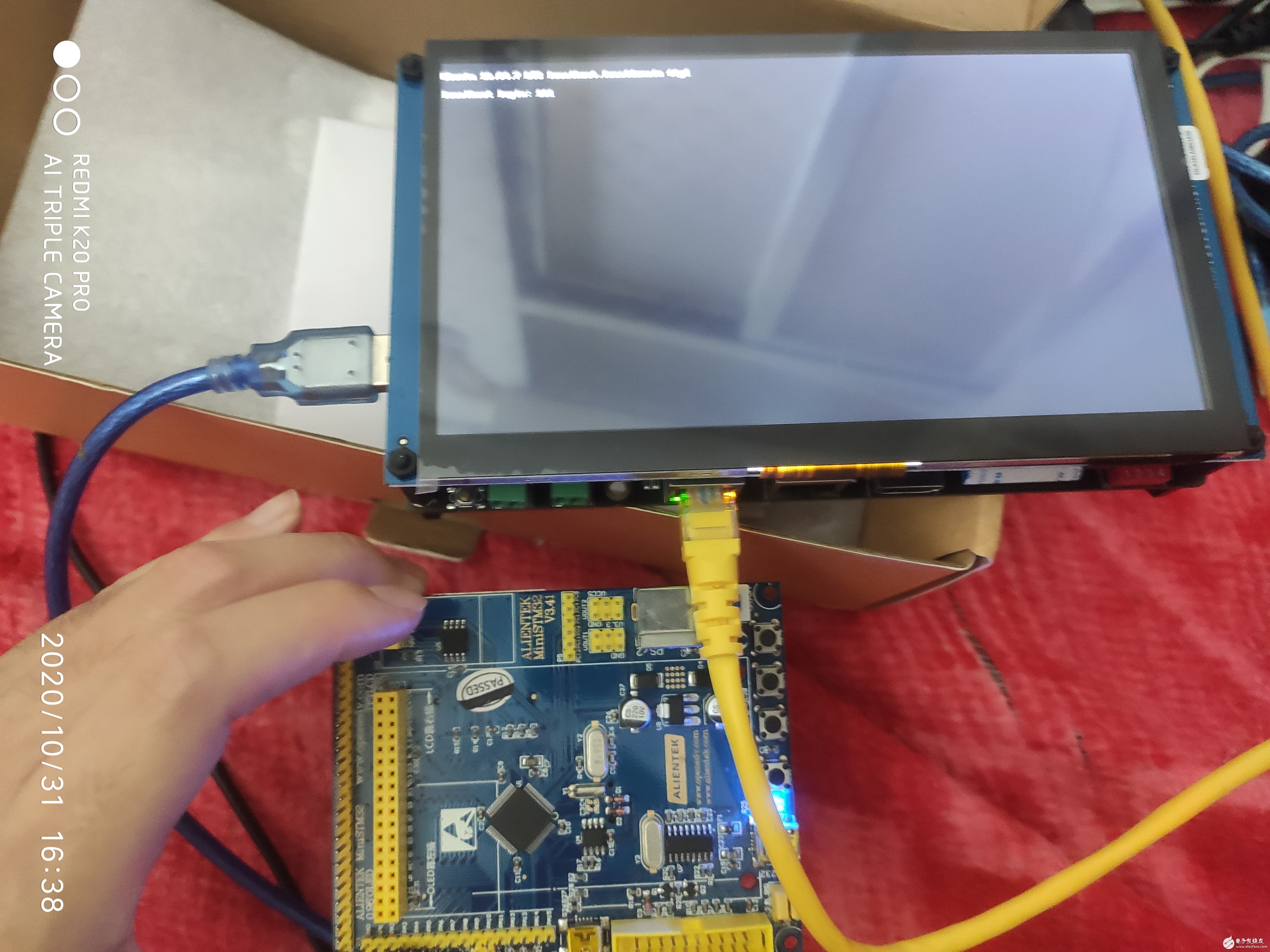`
本帖最后由 donatello1996 于 2020-10-31 21:32 编辑
由于
开发板自带GPIO接口资源稀少,因此我是打算使用USBHID的方式驱动
STM32单片机进行
通信,设想很美好,但是过程并不理想,未能成功实现,以此作为经验教训让大家吸取,进行IMX6UL开发时绕过此坑。这帖先上结果再说过程,同样的USBHID代码我复制到多款Cortex-A嵌入式开发板上,一一测试,现整理列表,供大家参考绕坑:
1.IMX6ULL(韦东山100ask) 失败
2.STM32MP157(米尔157) 失败
3.三星4418(友善之臂smart4418开发板)失败
4.IMX8开发板(英蓓特IMX8)失败
5.Cubieboard A80 成功
6.三星6818 (友善之臂nanopc t3开发板)成功
7.RK3399开发板 成功
8.树莓派3B+ 成功
9.全志H5(Nanopi K1+)成功
10.Windows虚拟机 成功
这些测试平台中,使用的hidapi-master代码均是同一份,USB接口引出的方式既有CPU直接引出也有接HUB芯片扩展,且安装的Linux发行版系统镜像不尽相同,有的是Ubuntu,有的是Debian,还有Centos,在编译代码之前都要用apt或者yum安装udev驱动库:
在与@蚂蚁大佬探究的过程中,他提议我使用
指令查看USB接口接入情况,都是一样的,HID设备都能被正确识别出来。STM32单片机的USB协议格式初始化为Custom HID,在没有深究驱动代码的前提下,我得出的结论是不同嵌入式平台对Custom HID的支持存在差异,比如IMX6 IMX8这种NXP平台无法驱动,STM32MP157则是因为别的原因导致无法驱动,那么,现在我开始介绍这个驱动代码的使用方法。
首先要从github或者别的地方下载到hidapi-master源码,这份源码包含api函数实现,测试代码,makefile等:
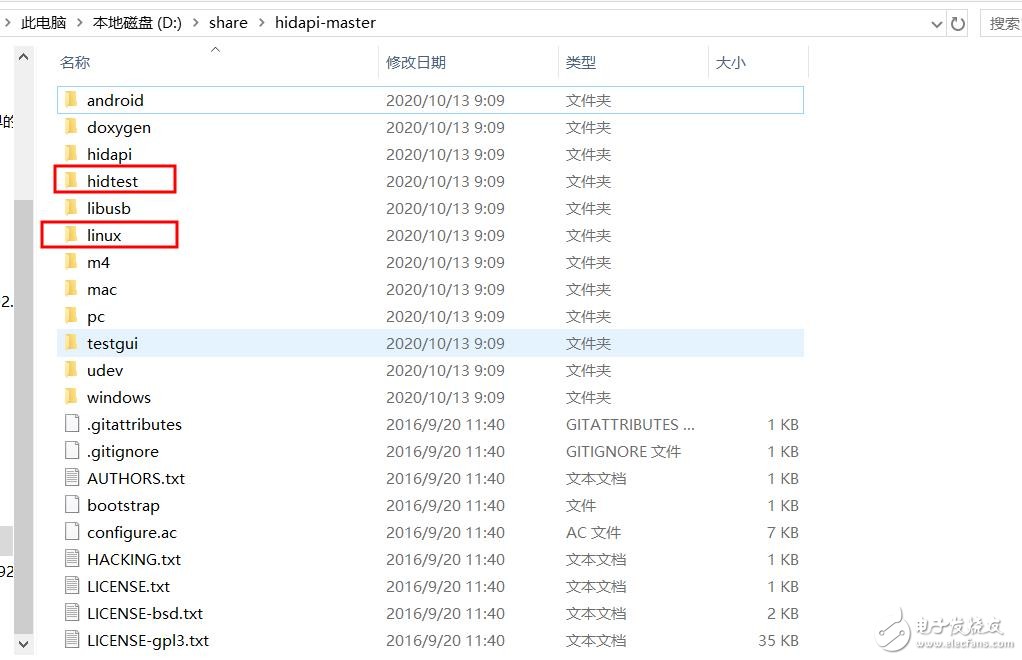
如图,linux文件夹下面的是针对linux系统的驱动文件,hidapi是全平台通用api头文件,test文件夹下面的是全平台通用的测试代码。
- /*******************************************************
- HIDAPI - Multi-Platform library for
- communication with HID devices.
- Alan Ott
- Signal 11 Software
- 8/22/2009
- Copyright 2009, All Rights Reserved.
- At the discretion of the user of this library,
- this software may be licensed under the terms of the
- GNU General Public License v3, a BSD-Style license, or the
- original HIDAPI license as outlined in the LICENSE.txt,
- LICENSE-gpl3.txt, LICENSE-bsd.txt, and LICENSE-orig.txt
- files located at the root of the source distribution.
- These files may also be found in the public source
- code repository located at:
- http://github.com/signal11/hidapi .
- ********************************************************/
- /** @file
- * @defgroup API hidapi API
- */
- #ifndef HIDAPI_H__
- #define HIDAPI_H__
- #include
- #ifdef _WIN32
- #define HID_API_EXPORT __declspec(dllexport)
- #define HID_API_CALL
- #else
- #define HID_API_EXPORT /**< API export macro */
- #define HID_API_CALL /**< API call macro */
- #endif
- #define HID_API_EXPORT_CALL HID_API_EXPORT HID_API_CALL /**< API export and call macro*/
- #ifdef __cplusplus
- extern "C" {
- #endif
- struct hid_device_;
- typedef struct hid_device_ hid_device; /**< opaque hidapi structure */
- /** hidapi info structure */
- struct hid_device_info {
- /** Platform-specific device path */
- char *path;
- /** Device Vendor ID */
- unsigned short vendor_id;
- /** Device Product ID */
- unsigned short product_id;
- /** Serial Number */
- wchar_t *serial_number;
- /** Device Release Number in binary-coded decimal,
- also known as Device Version Number */
- unsigned short release_number;
- /** Manufacturer String */
- wchar_t *manufacturer_string;
- /** Product string */
- wchar_t *product_string;
- /** Usage Page for this Device/Interface
- (Windows/Mac only). */
- unsigned short usage_page;
- /** Usage for this Device/Interface
- (Windows/Mac only).*/
- unsigned short usage;
- /** The USB interface which this logical device
- represents. Valid on both Linux implementations
- in all cases, and valid on the Windows implementation
- only if the device contains more than one interface. */
- int interface_number;
- /** Pointer to the next device */
- struct hid_device_info *next;
- };
- /** [url=home.php?mod=space&uid=2666770]@Brief[/url] Initialize the HIDAPI library.
- This function initializes the HIDAPI library. Calling it is not
- strictly necessary, as it will be called automatically by
- hid_enumerate() and any of the hid_open_*() functions if it is
- needed. This function should be called at the beginning of
- execution however, if there is a chance of HIDAPI handles
- being opened by different threads simultaneously.
-
- @ingroup API
- @returns
- This function returns 0 on success and -1 on error.
- */
- int HID_API_EXPORT HID_API_CALL hid_init(void);
- /** @brief Finalize the HIDAPI library.
- This function frees all of the static data associated with
- HIDAPI. It should be called at the end of execution to avoid
- memory leaks.
- @ingroup API
- @returns
- This function returns 0 on success and -1 on error.
- */
- int HID_API_EXPORT HID_API_CALL hid_exit(void);
- /** @brief Enumerate the HID Devices.
- This function returns a linked list of all the HID devices
- attached to the system which match vendor_id and product_id.
- If [url=home.php?mod=space&uid=96097]@p[/url] vendor_id is set to 0 then any vendor matches.
- If @p product_id is set to 0 then any product matches.
- If @p vendor_id and @p product_id are both set to 0, then
- all HID devices will be returned.
- @ingroup API
- [url=home.php?mod=space&uid=3142012]@param[/url] vendor_id The Vendor ID (VID) of the types of device
- to open.
- @param product_id The Product ID (PID) of the types of
- device to open.
- @returns
- This function returns a pointer to a linked list of type
- struct #hid_device, containing information about the HID devices
- attached to the system, or NULL in the case of failure. Free
- this linked list by calling hid_free_enumeration().
- */
- struct hid_device_info HID_API_EXPORT * HID_API_CALL hid_enumerate(unsigned short vendor_id, unsigned short product_id);
- /** @brief Free an enumeration Linked List
- This function frees a linked list created by hid_enumerate().
- @ingroup API
- @param devs Pointer to a list of struct_device returned from
- hid_enumerate().
- */
- void HID_API_EXPORT HID_API_CALL hid_free_enumeration(struct hid_device_info *devs);
- /** @brief Open a HID device using a Vendor ID (VID), Product ID
- (PID) and optionally a serial number.
- If @p serial_number is NULL, the first device with the
- specified VID and PID is opened.
- @ingroup API
- @param vendor_id The Vendor ID (VID) of the device to open.
- @param product_id The Product ID (PID) of the device to open.
- @param serial_number The Serial Number of the device to open
- (Optionally NULL).
- @returns
- This function returns a pointer to a #hid_device object on
- success or NULL on failure.
- */
- HID_API_EXPORT hid_device * HID_API_CALL hid_open(unsigned short vendor_id, unsigned short product_id, const wchar_t *serial_number);
- /** @brief Open a HID device by its path name.
- The path name be determined by calling hid_enumerate(), or a
- platform-specific path name can be used (eg: /dev/hidraw0 on
- Linux).
- @ingroup API
- @param path The path name of the device to open
- @returns
- This function returns a pointer to a #hid_device object on
- success or NULL on failure.
- */
- HID_API_EXPORT hid_device * HID_API_CALL hid_open_path(const char *path);
- /** @brief Write an Output report to a HID device.
- The first byte of @p data[] must contain the Report ID. For
- devices which only support a single report, this must be set
- to 0x0. The remaining bytes contain the report data. Since
- the Report ID is mandatory, calls to hid_write() will always
- contain one more byte than the report contains. For example,
- if a hid report is 16 bytes long, 17 bytes must be passed to
- hid_write(), the Report ID (or 0x0, for devices with a
- single report), followed by the report data (16 bytes). In
- this example, the length passed in would be 17.
- hid_write() will send the data on the first OUT endpoint, if
- one exists. If it does not, it will send the data through
- the Control Endpoint (Endpoint 0).
- @ingroup API
- @param device A device handle returned from hid_open().
- @param data The data to send, including the report number as
- the first byte.
- @param length The length in bytes of the data to send.
- @returns
- This function returns the actual number of bytes written and
- -1 on error.
- */
- int HID_API_EXPORT HID_API_CALL hid_write(hid_device *device, const unsigned char *data, size_t length);
- /** @brief Read an Input report from a HID device with timeout.
- Input reports are returned
- to the host through the INTERRUPT IN endpoint. The first byte will
- contain the Report number if the device uses numbered reports.
- @ingroup API
- @param device A device handle returned from hid_open().
- @param data A buffer to put the read data into.
- @param length The number of bytes to read. For devices with
- multiple reports, make sure to read an extra byte for
- the report number.
- @param milliseconds timeout in milliseconds or -1 for blocking wait.
- @returns
- This function returns the actual number of bytes read and
- -1 on error. If no packet was available to be read within
- the timeout period, this function returns 0.
- */
- int HID_API_EXPORT HID_API_CALL hid_read_timeout(hid_device *dev, unsigned char *data, size_t length, int milliseconds);
- /** @brief Read an Input report from a HID device.
- Input reports are returned
- to the host through the INTERRUPT IN endpoint. The first byte will
- contain the Report number if the device uses numbered reports.
- @ingroup API
- @param device A device handle returned from hid_open().
- @param data A buffer to put the read data into.
- @param length The number of bytes to read. For devices with
- multiple reports, make sure to read an extra byte for
- the report number.
- @returns
- This function returns the actual number of bytes read and
- -1 on error. If no packet was available to be read and
- the handle is in non-blocking mode, this function returns 0.
- */
- int HID_API_EXPORT HID_API_CALL hid_read(hid_device *device, unsigned char *data, size_t length);
- /** @brief Set the device handle to be non-blocking.
- In non-blocking mode calls to hid_read() will return
- immediately with a value of 0 if there is no data to be
- read. In blocking mode, hid_read() will wait (block) until
- there is data to read before returning.
- Nonblocking can be turned on and off at any time.
- @ingroup API
- @param device A device handle returned from hid_open().
- @param nonblock enable or not the nonblocking reads
- - 1 to enable nonblocking
- - 0 to disable nonblocking.
- @returns
- This function returns 0 on success and -1 on error.
- */
- int HID_API_EXPORT HID_API_CALL hid_set_nonblocking(hid_device *device, int nonblock);
- /** @brief Send a Feature report to the device.
- Feature reports are sent over the Control endpoint as a
- Set_Report transfer. The first byte of @p data[] must
- contain the Report ID. For devices which only support a
- single report, this must be set to 0x0. The remaining bytes
- contain the report data. Since the Report ID is mandatory,
- calls to hid_send_feature_report() will always contain one
- more byte than the report contains. For example, if a hid
- report is 16 bytes long, 17 bytes must be passed to
- hid_send_feature_report(): the Report ID (or 0x0, for
- devices which do not use numbered reports), followed by the
- report data (16 bytes). In this example, the length passed
- in would be 17.
- @ingroup API
- @param device A device handle returned from hid_open().
- @param data The data to send, including the report number as
- the first byte.
- @param length The length in bytes of the data to send, including
- the report number.
- @returns
- This function returns the actual number of bytes written and
- -1 on error.
- */
- int HID_API_EXPORT HID_API_CALL hid_send_feature_report(hid_device *device, const unsigned char *data, size_t length);
- /** @brief Get a feature report from a HID device.
- Set the first byte of @p data[] to the Report ID of the
- report to be read. Make sure to allow space for this
- extra byte in @p data[]. Upon return, the first byte will
- still contain the Report ID, and the report data will
- start in data[1].
- @ingroup API
- @param device A device handle returned from hid_open().
- @param data A buffer to put the read data into, including
- the Report ID. Set the first byte of @p data[] to the
- Report ID of the report to be read, or set it to zero
- if your device does not use numbered reports.
- @param length The number of bytes to read, including an
- extra byte for the report ID. The buffer can be longer
- than the actual report.
- @returns
- This function returns the number of bytes read plus
- one for the report ID (which is still in the first
- byte), or -1 on error.
- */
- int HID_API_EXPORT HID_API_CALL hid_get_feature_report(hid_device *device, unsigned char *data, size_t length);
- /** @brief Close a HID device.
- @ingroup API
- @param device A device handle returned from hid_open().
- */
- void HID_API_EXPORT HID_API_CALL hid_close(hid_device *device);
- /** @brief Get The Manufacturer String from a HID device.
- @ingroup API
- @param device A device handle returned from hid_open().
- @param string A wide string buffer to put the data into.
- @param maxlen The length of the buffer in multiples of wchar_t.
- @returns
- This function returns 0 on success and -1 on error.
- */
- int HID_API_EXPORT_CALL hid_get_manufacturer_string(hid_device *device, wchar_t *string, size_t maxlen);
- /** @brief Get The Product String from a HID device.
- @ingroup API
- @param device A device handle returned from hid_open().
- @param string A wide string buffer to put the data into.
- @param maxlen The length of the buffer in multiples of wchar_t.
- @returns
- This function returns 0 on success and -1 on error.
- */
- int HID_API_EXPORT_CALL hid_get_product_string(hid_device *device, wchar_t *string, size_t maxlen);
- /** @brief Get The Serial Number String from a HID device.
- @ingroup API
- @param device A device handle returned from hid_open().
- @param string A wide string buffer to put the data into.
- @param maxlen The length of the buffer in multiples of wchar_t.
- @returns
- This function returns 0 on success and -1 on error.
- */
- int HID_API_EXPORT_CALL hid_get_serial_number_string(hid_device *device, wchar_t *string, size_t maxlen);
- /** @brief Get a string from a HID device, based on its string index.
- @ingroup API
- @param device A device handle returned from hid_open().
- @param string_index The index of the string to get.
- @param string A wide string buffer to put the data into.
- @param maxlen The length of the buffer in multiples of wchar_t.
- @returns
- This function returns 0 on success and -1 on error.
- */
- int HID_API_EXPORT_CALL hid_get_indexed_string(hid_device *device, int string_index, wchar_t *string, size_t maxlen);
- /** @brief Get a string describing the last error which occurred.
- @ingroup API
- @param device A device handle returned from hid_open().
- @returns
- This function returns a string containing the last error
- which occurred or NULL if none has occurred.
- */
- HID_API_EXPORT const wchar_t* HID_API_CALL hid_error(hid_device *device);
- #ifdef __cplusplus
- }
- #endif
- #endif
在使用代码之前,要在目标平台上安装udev驱动库:

将驱动库代码,测试代码和编写好的makefile放到板子上面:
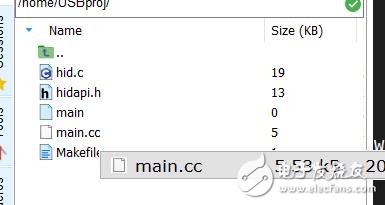
连接Custom HID设备到板子上面,这个STM32F103板子就是了:
使用lsu***的两条指令查看USB设备接入情况:

运行结果:
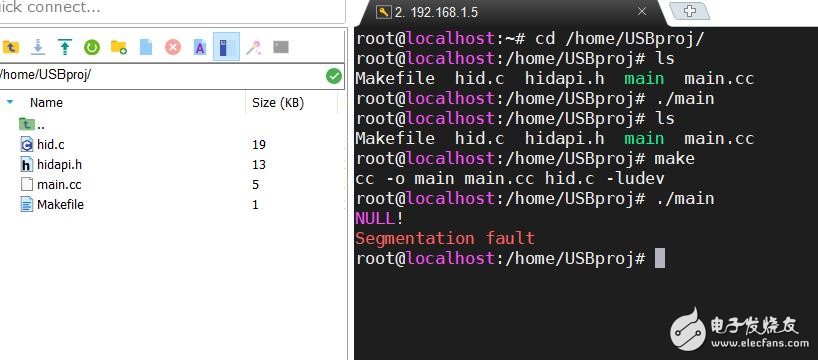
值得注意的是,对于IMX6UL驱动USB设备,在正点原子厂商发布的手册中有提到:
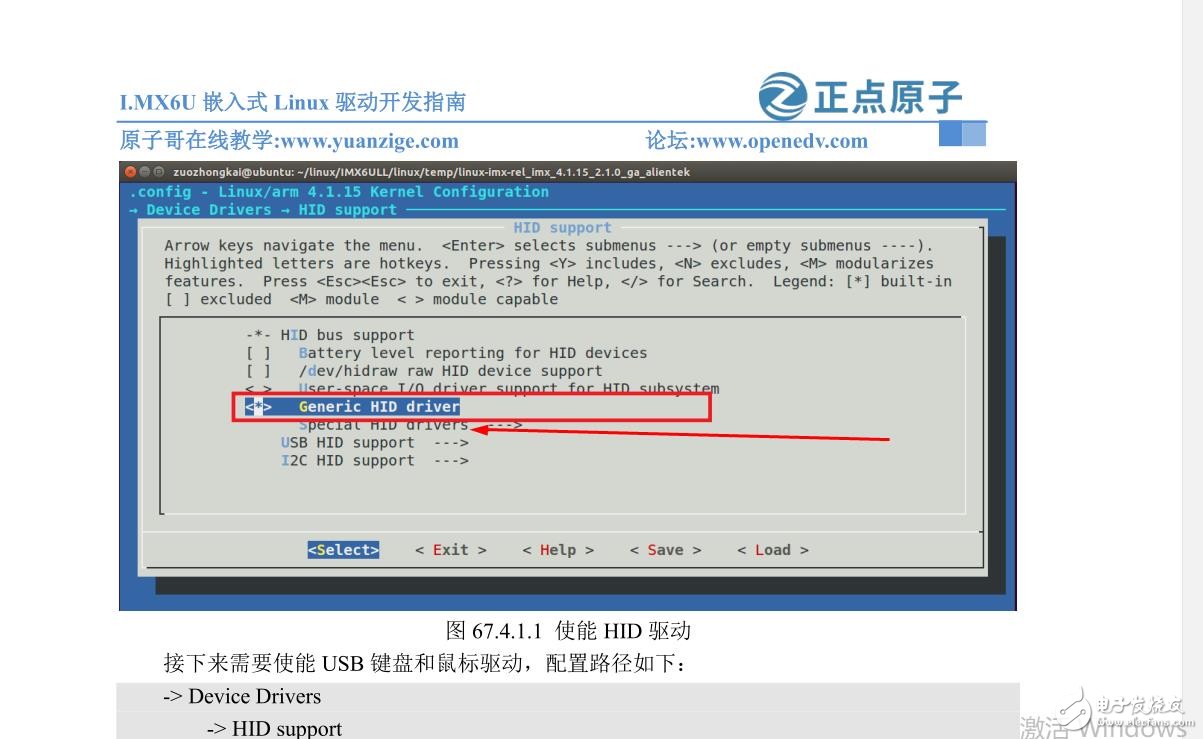
手册中提到了驱动鼠标键盘这种方式的Generic HID Support,而在这个选项下面有一个Special USB Support,不清楚这个是否是Custom HID的支持,这个之后再了解。
`
